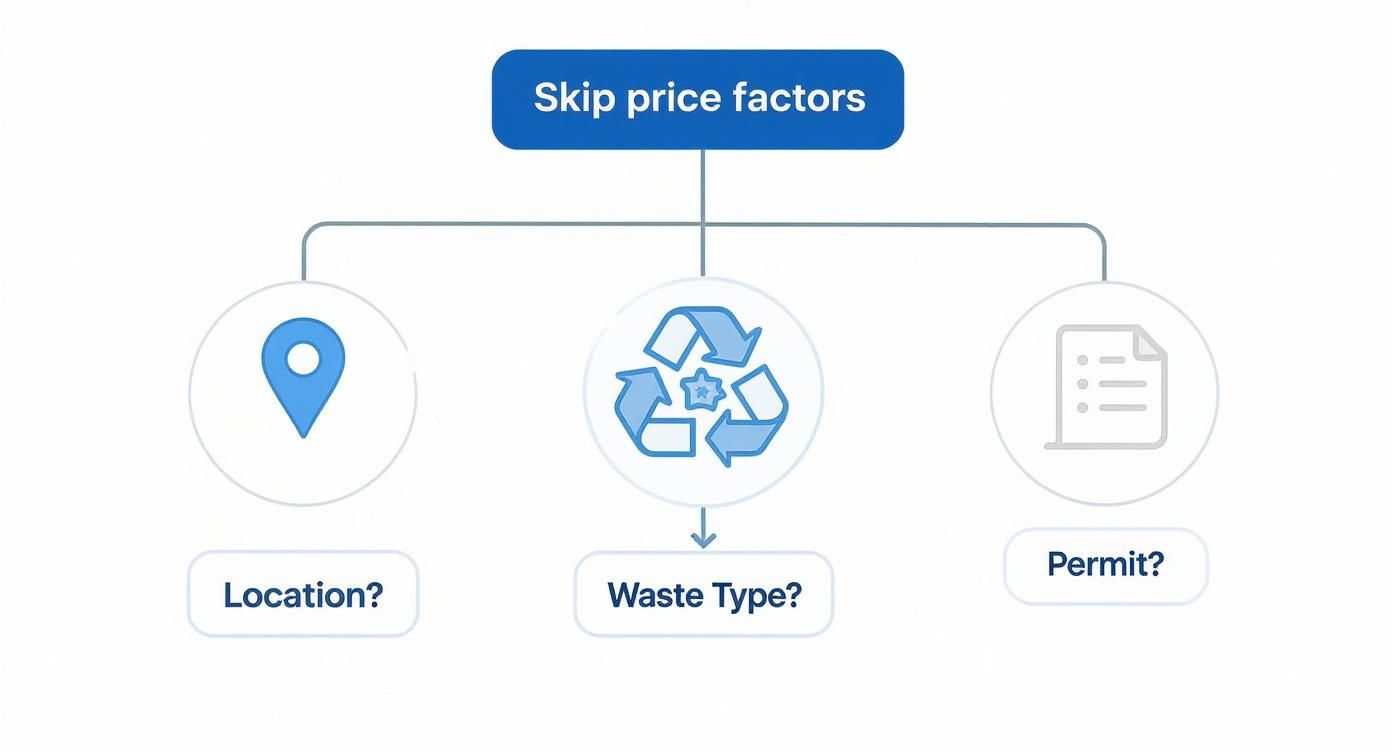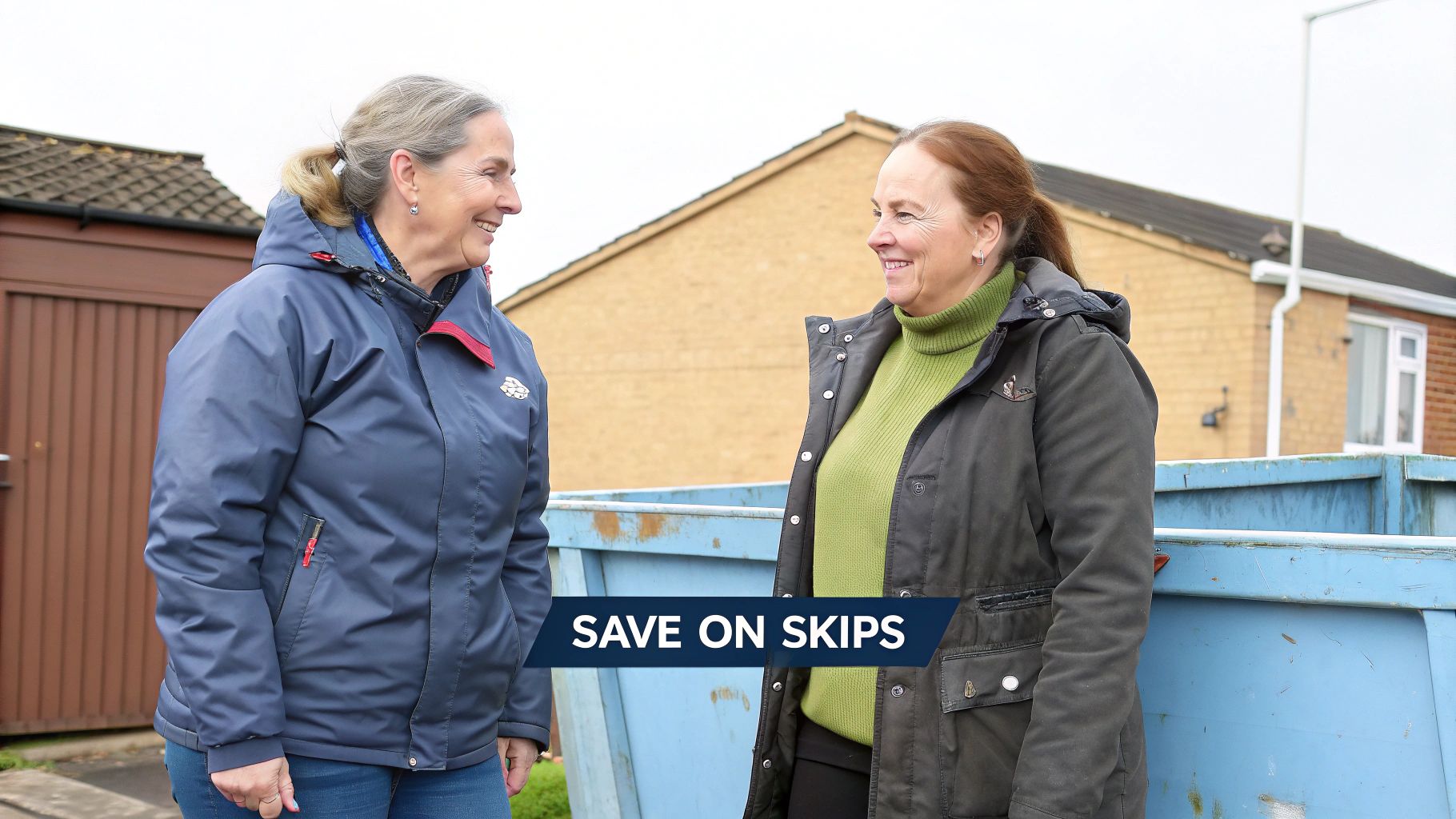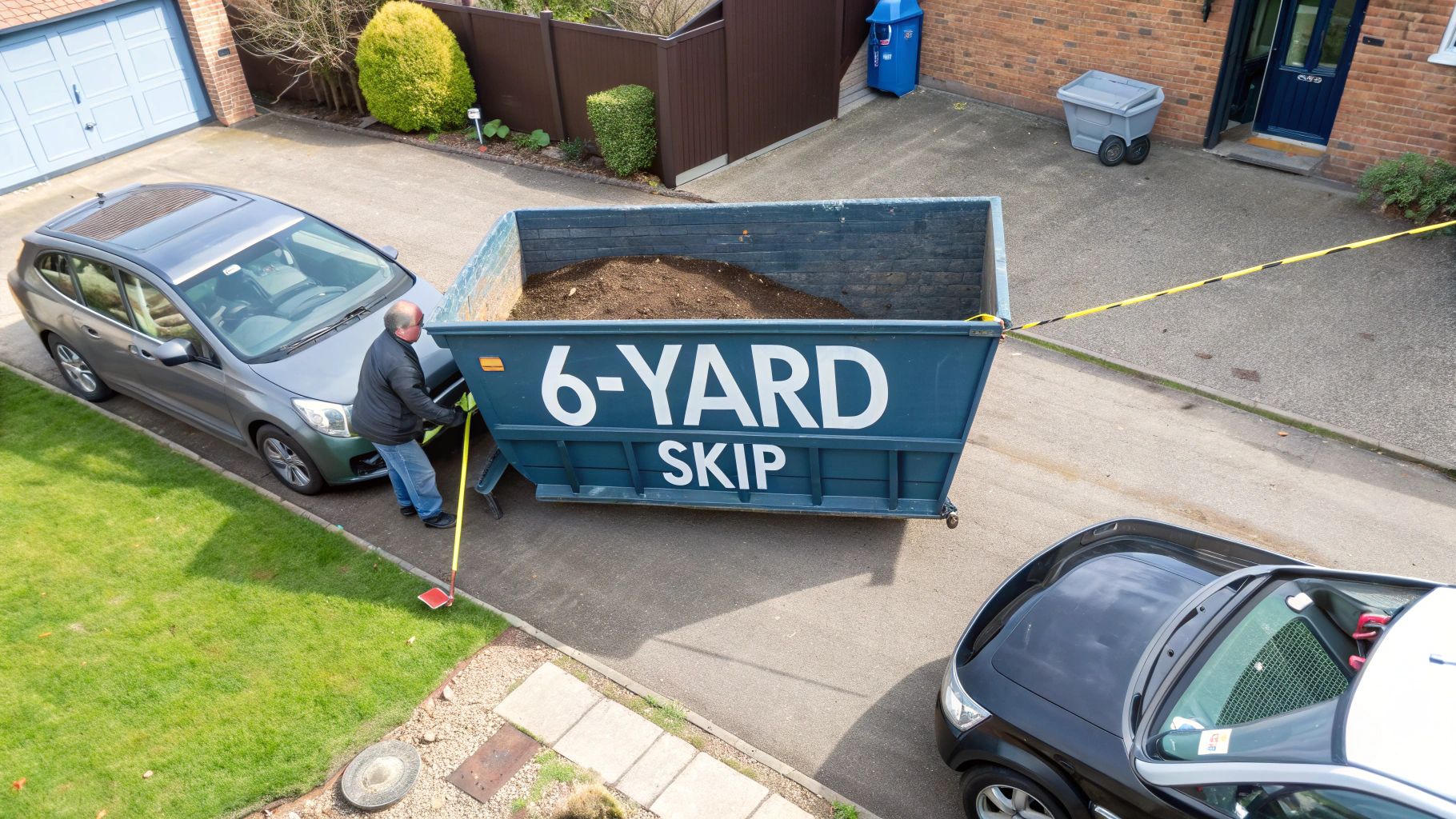How Much Are Skips? Your Complete UK Price Guide
How Much Are Skips? Your Complete UK Price Guide
So, you're wondering, "how much are skips going to set me back?" Let's get straight to it. For a small mini skip, you're generally looking at a cost between £120 and £200. If you need something bigger, like a standard builder's skip, the price is typically in the £250 to £400 range. These figures are a great starting point for budgeting your project.
Your Quick Guide to Skip Hire Costs

Trying to figure out skip hire prices can feel like hitting a moving target, but it's actually more straightforward than you might think. The final price on your quote really boils down to two things: the skip's size and a few other key factors.
Think of it like buying a car. The skip's size is the base price. Then you have the 'optional extras' that adjust the final cost—things like your location, the type of waste you're chucking out, and whether you need a permit.
Of course, the main driver of the price is always going to be the size. A mini skip (around 2 cubic yards) is ideal for a small garden clear-out and holds about 25 bin bags. As you move up the ladder, a 4-yard midi skip will cost you somewhere between £180 and £300, and a popular 6-yard builder’s skip is usually between £250 and £400. For those really big jobs, an 8-yard maxi skip can cost from £320 up to £500.
Average Skip Hire Prices in the UK
To give you a clearer picture, we've put together a quick-reference table. This should help you get a realistic idea of what to budget for the most common skip sizes right from the get-go.
| Skip Size | Typical Capacity (Cubic Yards) | Approximate Bin Bags | Average Price Range (£) |
|---|---|---|---|
| Mini Skip | 2 yards | 20-30 | £120 – £200 |
| Midi Skip | 4 yards | 30-40 | £180 – £300 |
| Builder's Skip | 6-8 yards | 50-80 | £250 – £400 |
| Maxi Skip | 10-12 yards | 80-120 | £320 – £500+ |
Just remember, these figures are national averages. Prices tend to be a bit steeper in London and the South East because of higher operational costs. For a more localised look, our guide to local skip hire prices in Dorset breaks it down with specific examples for our area.
Now, let's dig into the other factors that can shape your final quote.
What Really Determines Your Skip Hire Price?
Those average prices we talked about are a great starting point, but the final figure on your skip hire quote is shaped by a few other crucial factors. Think of the skip size as the base price, with the following details adding or subtracting from the total. Getting your head around these is the key to knowing exactly what you’re paying for.
It's just like any other home project, really. Once you understand the variables, you can budget properly and make smarter choices. This principle holds true across the board, and you can learn more about understanding cost factors for home services to see how it applies elsewhere.
Your Location and Its Impact
Where you live plays a surprisingly big role in how much you'll pay for a skip. There's a well-known 'North-South divide' in UK pricing, meaning skip hire in London and the South East is almost always more expensive than in the North or Scotland.
This isn't just random pricing. It's a direct reflection of higher running costs in those areas – things like wages, fuel, and the fees charged by waste disposal sites are all pricier in and around major cities.
For instance, hiring an 8-yard builder's skip in central London could easily set you back £350 or more. In contrast, the very same skip in a smaller town in the Midlands might be closer to £270. It’s all down to local economics.
The Type of Waste You're Tossing Out
Not all rubbish is created equal, and this definitely impacts the price. Skip companies have to process and dispose of different materials in specific ways, and some are simply more expensive to handle than others.
- Inert Waste: This is your soil, clay, rubble, and concrete. It’s often cheaper to get rid of because it’s easily recycled into new building aggregates.
- General Mixed Waste: This is the most common fill type, covering everything from old furniture and household junk to wood and other non-hazardous bits from a renovation. The cost is pretty standard as it all needs sorting at a waste transfer station.
- Green Waste: Garden clippings, branches, and soil are also quite simple to process, usually by composting.
- Hazardous Waste: Now for the important bit. Items like asbestos, plasterboard (when mixed with other waste), fridges, and old tyres require specialist disposal and are strictly banned from standard skips. The fines for trying to sneak them in are hefty, so don't risk it.
The sheer weight of your waste is also a massive factor. Heavy materials like soil and rubble can quickly push a skip to its legal road transport limit, which can influence the size you're allowed to book for that waste type. We cover this in more detail in our post on whether skips have a weight limit.
Hire Duration and Council Permits
Most quotes include a standard hire period of one to two weeks. If you think you’ll need the skip for longer, make sure you mention this when you book. An extended hire period can sometimes come with extra charges.
Another cost you absolutely can't forget is the skip permit. If you don't have a private driveway or garden to place the skip on, it has to go on a public road. To do this legally, you need a permit from your local council.
Your skip hire company will nearly always sort this out for you, but the cost will be added to your bill. Depending on your council, this can be anywhere from £30 to over £100, so it’s a significant extra.
Choosing the Right Skip Size for Your Project
Getting the skip size right is probably the most important decision you'll make when hiring one. It's a classic Goldilocks problem: go too small, and you'll be kicking yourself when you have to order a second one. Go too big, and you're literally paying for fresh air. Nailing the size from the start saves you a lot of money and hassle down the line.
Think of it like packing for a trip. You wouldn't lug a massive suitcase around for a weekend away, but you also can't cram two weeks' worth of gear into a tiny carry-on. It’s all about matching the container to the job at hand. While things like your location and the type of waste you have will affect the price, the size is the one factor you have complete control over.

As you can see, several pieces come together to determine your final quote, but picking the right size is your best bet for keeping the cost predictable.
Decoding Common Skip Sizes
Skips are measured in cubic yards, but let's be honest, that doesn't mean much to most people. A much better way to visualise it is by thinking about how many standard black bin bags each one can hold.
Here's a quick rundown of the most common options:
- Mini Skips (2-3 Yards): These are perfect for those little weekend jobs – clearing out the shed, a bit of a garden tidy-up, that sort of thing. They’ll comfortably hold 20-30 bin bags.
- Midi Skips (4-5 Yards): A really popular choice for small kitchen or bathroom rip-outs and bigger garden clearances. A 4-yard skip, for example, holds around 30-40 bin bags.
- Builder's Skips (6-8 Yards): This is the workhorse of the skip world. It's the go-to for most building projects, home renovations, and getting rid of bulky waste. An 8-yard skip can handle roughly 60-80 bin bags.
- Maxi Skips (10-12 Yards): Ideal for really big jobs like a full house clearance or commercial projects where you have lots of light, bulky stuff to shift.
Here’s a crucial tip from years in the business: if you’re hesitating between two sizes, always go for the bigger one. It’s almost always cheaper to hire a slightly larger skip from the outset than it is to realise you've run out of space and have to order a second one. Think of that extra space as a cheap insurance policy.
Which Skip Size Do You Need?
So, how do you match these sizes to your actual project? Getting this right is key to keeping your job running smoothly and on budget. We have a more detailed guide on what size skip you might need if you want to dive deeper, but this table should give you a great starting point.
| Skip Size | Typical Dimensions (L x W x H) | Best For (Project Examples) | Things to Consider |
|---|---|---|---|
| Midi Skip | 1.8m x 1.3m x 0.9m | Small kitchen refits, bathroom renovations, extensive garden clearances. | The perfect middle-ground for projects that generate just a bit too much waste for a mini skip. |
| Builder's Skip | 3.4m x 1.7m x 1.2m | Full renovations, construction site waste, bulky furniture disposal. | By far the most versatile and commonly hired skip. It’s the standard for general building work. |
| Maxi Skip | 3.7m x 1.75m x 1.8m | Large house clearances, shop fit-outs, office clear-outs. | Brilliant for high volumes of lighter materials, but not designed for heavy waste like soil or rubble. |
Matching the skip to the job isn't just about saving money; it's about making the whole process simpler from start to finish. A quick assessment of what you're throwing out will point you toward the most sensible and cost-effective choice.
Navigating Skip Permits and Placement Rules

One of the biggest details that can trip people up is figuring out where the skip is actually going to live. If you’ve got a private driveway, a front garden, or any other patch of land on your property, you’re golden. No permit needed.
But what if your only option is the public road outside your house? That’s when you’ll legally need a skip permit from your local council. This isn't just a bit of bureaucratic red tape; it’s all about public safety. A permit makes sure the skip is placed correctly so it doesn’t block traffic or cause a hazard for pedestrians. Trying to skip this step is a recipe for trouble, often leading to hefty fines and an order to get the skip moved immediately.
The good news is, you don’t have to wade through council paperwork yourself. When you hire a skip from a reputable company like The Waste Group, we handle the entire permit application for you. We know exactly what the local authorities need and will sort it all out, simply adding the council’s fee to your final bill.
Understanding Permit Costs and Timelines
The price of a skip permit can vary quite a bit from one council to the next. In some areas, you might be looking at as little as £30, but in busier towns and cities, that figure can easily climb to over £100. This fee goes directly to the council for the licence to temporarily take up a piece of the public highway.
Timing is another crucial piece of the puzzle. Councils don't issue these permits instantly. You should expect the application process to take anywhere from three to seven working days. It’s vital to factor this delay into your project timeline. You can’t simply order a skip for next-day delivery if it’s going on the road; the permit has to be in hand first.
It’s a classic mistake to assume a skip can show up the next day no matter where you put it. Always tell your skip provider you’ll need a road permit right when you book. That way, they can get the ball rolling immediately and give you a realistic delivery date.
Essential Safety Rules for Roadside Skips
Once your permit is approved and the skip lands on the road, there are a few legal safety requirements to keep it visible and safe for the public. Your skip hire company will supply all the necessary gear, but it’s helpful to know what to expect.
- Traffic Cones: The skip has to be surrounded by traffic cones. This clearly marks its position and gives drivers plenty of warning during the day.
- Night Lights: For when it gets dark, flashing safety lamps must be fixed to each end of the skip. This is an absolute must-have to prevent accidents at night.
- Reflective Markings: The skip itself should have reflective markings on its corners, making it pop when hit by car headlights.
Your provider will get all this set up when they deliver the skip, but it’s up to you to make sure the lights and cones stay put for the entire hire period. Keeping on top of these simple rules means your project can continue without endangering anyone or running the risk of fines.
Smart Strategies to Save Money on Your Skip Hire

Knowing the sticker price for a skip is one thing, but getting the best possible value for your money is the real win. With a few smart moves, you can knock a decent amount off your final bill without cutting corners on the service you actually need.
It nearly always starts with picking the right size. Paying for a half-empty skip is like buying a bus ticket for a taxi ride—you're paying for space you simply don't use. It’s always worth taking a moment to properly estimate your waste volume before you book.
Optimise Your Waste Disposal
One of the best ways to save a bit of cash is to be clever about what you’re throwing away and how you’re doing it. Skip hire companies often have different prices for different materials, mainly because some are far cheaper and easier to recycle than others.
Before you start chucking everything in, see if you can separate your waste into a few piles.
- Single-Stream Waste: Got a huge amount of one thing, like soil, rubble, or garden waste? Ask your provider if they offer a reduced rate for it. These materials are highly recyclable and take much less work to process on their end.
- Scrap Metal: Don't just toss old metal radiators or copper pipes into a mixed skip. Many local scrap yards will actually pay you for these items. It’s a great way to turn your waste into a small profit.
This approach is becoming more common as the waste industry focuses more on sustainability. As companies get better at recycling to reduce their landfill fees, customers who provide well-sorted materials often see some of those savings passed on. You can learn more about the evolving landscape of skip hire in the UK and how it's affecting prices.
Crucial Tip: Avoid Overfilling Your Skip
That 'level load' line isn't just a friendly suggestion; it's a legal and safety requirement. Overfilled skips are a hazard to transport, and drivers are legally forbidden from collecting them. You’ll be the one stuck removing the excess waste, which causes delays and can lead to extra charges.
Share the Load and the Cost
Here’s another brilliant and often overlooked strategy: team up with a neighbour. If you know someone down the street is also planning a clear-out or some garden work, why not go in on a skip together?
By splitting the hire of a larger skip, you can effectively cut your individual costs in half. A single 8-yard builder's skip is far cheaper than hiring two separate 4-yard midi skips. This simple bit of coordination is great for everyone's budget and even reduces the number of lorry journeys, making it a greener choice, too. Just make sure you agree on who gets what space beforehand to keep things simple and fair for everyone.
Your Skip Hire Questions Answered
Alright, let's wrap things up by tackling some of the questions we hear all the time. Getting these sorted before you book can save a lot of headaches and make the whole process feel much more straightforward. Think of it as a final check to make sure you're completely ready.
We've pulled together the most common queries to give you clear, simple answers right when you need them.
What Can’t I Put in a Skip?
This is probably the most important question of them all. For safety and environmental reasons, you absolutely cannot throw hazardous materials into a standard skip. These items need specialist handling and can't be mixed with general waste.
Here’s a list of the usual suspects that are strictly off-limits:
- Asbestos
- Fridges and freezers
- Tyres and gas cylinders
- Car batteries and electrical appliances (often called WEEE waste)
- Paint tins (unless they are bone dry), oils, and chemical solvents
- Any kind of clinical or medical waste
Trying to sneak any of these items in can cause real problems. Your driver might refuse to collect the skip, or you could be hit with some hefty extra fees to cover the cost of safe disposal. It’s always best to check with your provider for their specific list before you start filling.
How Long Can I Keep the Skip?
The standard hire period is usually somewhere between one and two weeks. For most jobs, like a garden overhaul or a small room renovation, this gives you plenty of time to get everything cleared out.
That said, most companies are pretty flexible. If you think you’ll need it for a bit longer, just have a word with them when you book. An extended hire might add a little to the cost, but it's easily arranged. On the flip side, if you get the job done early, you can almost always give them a ring to get it collected sooner.
Is It Cheaper to Take Rubbish to the Tip Myself?
For a really small amount of rubbish – we’re talking a couple of bin bags from a weekend declutter – then yes, a trip to your local tip (or household waste recycling centre) can be cheaper. It's often a free service for residents.
But once you’re dealing with anything more substantial, a skip quickly becomes the smarter choice, both in terms of cost and convenience. You have to think about the fuel for multiple trips back and forth, the value of your own time, and the very real risk of scratching or damaging your car with heavy, dirty waste. A skip saves you all that hassle and gets the job done in one go.
A 'level load' means your waste must not be filled any higher than the sides of the skip. This isn't just a polite request; it's a critical safety and legal rule for transport. Overfilled skips are dangerous on the road, and our drivers are legally forbidden from collecting them. This will only lead to delays and potential extra charges for you.
Ready to get a clear, competitive quote for your project? The Waste Group offers reliable, next-day skip hire across Dorset with a price-match guarantee. Find the perfect skip for your needs and book online today.


